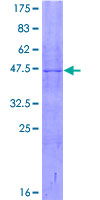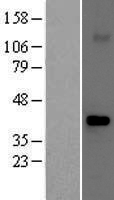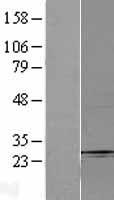order histories, retained contact details for faster checkout, review submissions, and special promotions.
Forgot password?
order histories, retained contact details for faster checkout, review submissions, and special promotions.
Location
Corporate Headquarters
Vector Laboratories, Inc.
6737 Mowry Ave
Newark, CA 94560
United States
Telephone Numbers
Customer Service: (800) 227-6666 / (650) 697-3600
Contact Us
Additional Contact Details
order histories, retained contact details for faster checkout, review submissions, and special promotions.
Forgot password?
order histories, retained contact details for faster checkout, review submissions, and special promotions.
FBXO32 / Fbx32
F-box protein 32
FBXO32 / Fbx32 is a member of the F-box protein family which is characterized by an approximately 40 amino acid motif, the F-box. The F-box proteins constitute one of the four subunits of the ubiquitin protein ligase complex called SCFs (SKP1-cullin-F-box), which function in phosphorylation-dependent ubiquitination. The F-box proteins are divided into 3 classes: Fbws containing WD-40 domains, Fbls containing leucine-rich repeats, and Fbxs containing either different protein-protein interaction modules or no recognizable motifs. The protein encoded by this gene belongs to the Fbxs class and contains an F-box domain. This protein is highly expressed during muscle atrophy, whereas mice deficient in this gene were found to be resistant to atrophy. This protein is thus a potential drug target for the treatment of muscle atrophy. Alternative splicing results in multiple transcript variants encoding different isoforms.
| Gene Name: | F-box protein 32 |
| Family/Subfamily: | F-Box |
| Synonyms: | FBXO32, Atrogin 1, ATROGIN1, F-box protein 32, F-box only protein 32, Fbx32, Muscle atrophy F-box protein, MAFBX, Atrogin-1 |
| Target Sequences: | NM_058229 NP_478136.1 Q969P5 |
Publications (1)







If you do not find the reagent or information you require, please contact Customer.Support@LSBio.com to inquire about additional products in development.









